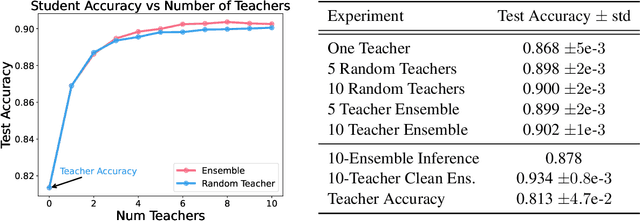Knowledge Distillation: Bad Models Can Be Good Role Models
Paper and Code
Mar 28, 2022

Large neural networks trained in the overparameterized regime are able to fit noise to zero train error. Recent work \citep{nakkiran2020distributional} has empirically observed that such networks behave as "conditional samplers" from the noisy distribution. That is, they replicate the noise in the train data to unseen examples. We give a theoretical framework for studying this conditional sampling behavior in the context of learning theory. We relate the notion of such samplers to knowledge distillation, where a student network imitates the outputs of a teacher on unlabeled data. We show that samplers, while being bad classifiers, can be good teachers. Concretely, we prove that distillation from samplers is guaranteed to produce a student which approximates the Bayes optimal classifier. Finally, we show that some common learning algorithms (e.g., Nearest-Neighbours and Kernel Machines) can generate samplers when applied in the overparameterized regime.
 Add to Chrome
Add to Chrome Add to Firefox
Add to Firefox Add to Edge
Add to Edge